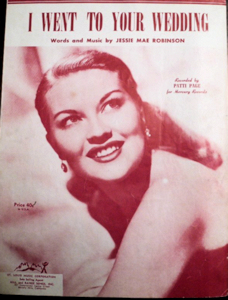Related Research Articles
"How High the Moon" is a jazz standard with lyrics by Nancy Hamilton and music by Morgan Lewis. It was first featured in the 1940 Broadway revue Two for the Show, where it was sung by Alfred Drake and Frances Comstock. In Two for the Show, this was a rare serious moment in an otherwise humorous revue.
"Wheel of Fortune" is a popular song written by Bennie Benjamin and George David Weiss and published in 1951. It is best remembered in the 1952 hit version by Kay Starr.
"Blues in the Night" is a popular blues song which has become a pop standard and is generally considered to be part of the Great American Songbook. The music was written by Harold Arlen, the lyrics by Johnny Mercer, for a 1941 film begun with the working title Hot Nocturne, but finally released as Blues in the Night. The song is sung in the film by William Gillespie.
"Blue Room" is a show tune from the 1926 Rodgers and Hart musical The Girl Friend, where it was introduced by Eva Puck and Sammy White. It is also a jazz standard.
"I Don't See Me in Your Eyes Anymore" is a popular song, written by Bennie Benjamin and George David Weiss and published in 1949. The song was popularized that year by Gordon Jenkins and His Orchestra and by Perry Como.

"I Went to Your Wedding" is a popular song written and composed by Jessie Mae Robinson and published in 1952.
"Don't Let the Stars Get in Your Eyes" is a country song about a man away from home who is worried that his paramour may unwittingly stray from their relationship. The song was recorded in many different styles by many artists. It was written by Winston L. Moore and published in 1952. Perry Como's recording of the song became a No. 1 hit in both the US and UK.
"Love Me or Leave Me" is a popular song written in 1928 by Walter Donaldson with lyrics by Gus Kahn. The song was introduced in the Broadway musical comedy Whoopee!, which opened in December 1928. Ruth Etting's performance of the song was so popular that she was also given the song to sing in the play Simple Simon, which opened in February 1930.
"Be My Life's Companion" is a popular song. It was written by Bob Hilliard (lyricist) and Milton De Lugg (composer) and published in 1951.
"So in Love" is a popular song, written by Cole Porter, from his musical Kiss Me, Kate, which was based on Shakespeare's The Taming of the Shrew. It was sung in the show by Patricia Morison, reprised by Alfred Drake, and further popularized by Patti Page in 1949.
"With My Eyes Wide Open, I'm Dreaming" is a popular song. The music was composed by Harry Revel with lyrics by Mack Gordon, and published in 1934. The song was introduced by Jack Oakie and Dorothy Dell in the movie Shoot the Works directed in 1934 by Wesley Ruggles.
"Mam'selle" is a bittersweet song about a rendez-vous with a "mam'selle" (mademoiselle) in a small café. The music was written by Edmund Goulding, the lyrics by Mack Gordon.
"I Dream of You " is a popular song.
"Love Walked In" is a song composed by George Gershwin, with lyrics by Ira Gershwin. The tune was composed in 1930, but the lyric was not written until 1937, for the movie musical The Goldwyn Follies (1938), where it was sung by Kenny Baker. Hit versions include Sammy Kaye (1938), The Hilltoppers (1953), Ella Fitzgerald (1959) and Dinah Washington (1960). Artie Shaw recorded the song in the early 1940s.
"Hoop-Dee-Doo" is a popular song published in 1950 with music by Milton De Lugg and lyrics by Frank Loesser.
"More Than You Know" is a popular song, composed by Vincent Youmans with lyrics by Billy Rose and Edward Eliscu. The song was published in 1929.
"That's My Desire" is a 1931 popular song with music by Helmy Kresa and lyrics by Carroll Loveday.
"I Don't Know Why " is a 1931 popular song.

"Poor Butterfly" is a popular song. It was inspired by Giacomo Puccini's opera Madame Butterfly and contains a brief musical quote from the Act two duet Tutti i fior in the verse.
"Among My Souvenirs" is a 1927 song with words by Edgar Leslie and music by Horatio Nicholls.
References
- ↑ "Search Results for 'and so to sleep again' | SecondHandSongs". SecondHandSongs.
- 1 2 Columbia Records in the 38000 to 38499 series
- 1 2 Whitburn, Joel (1973). Top Pop Records 1940-1955. Record Research.
- ↑ Mercury Records in the 5000 to 5497 series
- ↑ Mercury Records in the 5500 to 5912 series
- ↑ MGM Records in the 10000 to 10499 series
- ↑ Manor Records listing
- ↑ RCA Victor Records in the 20-2500 to 20-2999 series
- ↑ Decca Records in the 24000 to 24499 series
- ↑ Varsity Records listing